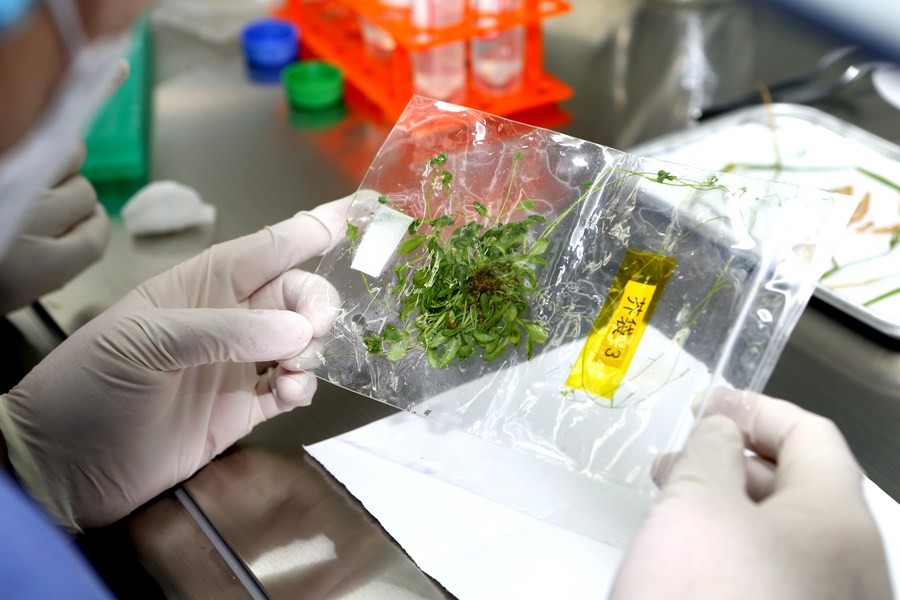Chinese scientists have developed space-bred varieties to address Pakistan’s future food security challenge
Pakistan’s agricultural industry has suffered significant difficulties recently. The country’s steady agricultural growth rates, which are necessary for maintaining the economy, are in danger due to drought, rising soil salinity, plant stress, and other effects of climate change, which has further put Pakistan’s food security in the spotlight.
China & Pak cooperation in space bred varities
According to a Pakistani minister, the new phase of seed cooperation between Pakistan and China is crucial for Pakistan to tackle the challenge of food security in the future. China with the assistance of Pakistan have send seeds to the Chinese space station for breeding in space. The seeds were subjected to cosmic radiation and microgravity to change their genes.
China is the first nation in the world to consistently adopt space mutagenesis, which it has been experimenting with since 1987. Chinese researchers have created space-bred versions of wheat, rice, corn, soybeans, alfalfa, sesame, cotton, watermelons, tomatoes, sweet peppers, and other plants.
Impact of Genetically modified organisms
Genetic diversity is directly related to biodiversity. The variability in the traits/DNA of an organisms that make up an ecosystem, will inform the characteristics of the organisms that make up a population. Hence, preserving and monitoring genetic diversity is crucial for agriculture as well as the environment since more variation in DNA will provide organisms a better chance to adapt to a changing environment but should not be at the cost of harming our ecosystem.1.
What adverse impact could GMOs have on genetic diversity? The possibility of GMOs breeding with wild plants or animals is one. Another factor is that GMOs can overtake a population due to advantageous features.
The Irish Potato Famine, also known as the Great Hunger which began in 1845 in Ireland is one incident when a lack of genetic diversity contributed to a significant agricultural disaster. Ireland during this time relied significantly on potatoes for nutrition, and the varieties they grew were not started from seeds. Instead, portions of a parent potato were planted. In this way, all potatoes were genetic clones of their parents and shared the
1https://sitn.hms.harvard.edu/flash/2015/challenging-evolution-how-gmos-can-influence-genetic-
diversity/#:~:text=A%20major%20concern%20of%20genetically,between%20individuals%20of%20a%20species.
same genes. These potato crops lacked genetic diversity, which was disastrous when an invasive pathogen called P. infestans killed out the whole population.2 Because there was low genetic diversity in Irish potatoes at the time, a vast majority of potato crops were wiped out by the pathogen.
The enormous variety of wild plant kinds we observe today is due to their ability to mate, naturally commonly known as hybridization. GMOs can also affect genetic diversity through uncontrolled growth of a genetically engineered population. If beneficial genes are inserted into GMOs, they may be able to develop greater fitness than their wild relative but this could be harmful because the GMOs would multiply more frequently and grow more quickly, giving them the opportunity to scavenge resources from their non-GMO cousins if they live in the same habitat.
China scavenging on other countries lands
China has carried crop seeds into orbit on dozens of flights. Yujiao 1, a variety of sweet pepper developed by Chinese scientists, became the first crop to be grown in space in 1990. According to Liu, Yujiao 1 yields substantially bigger fruit and is more disease resistant than typical sweet pepper cultivars grown in China3. According to Liu, it is just one of more than 200 space-mutated crop varieties developed in China during the previous 30 years.
On the contrary China does not allow foreign countries to sell GMO seeds in China. It is also interesting to note that they buy foreign land for providing food security to themselves and putting other countries environment and soil at stake. For Example, according to U.S. department of agriculture (USDA) and Agriculture foreign investment disclosure reports, Chinese investor’s holdings of U.S. agricultural land surged from 13,20 acres in 2010 to 352,140 acres in 2020. Chinese companies particularly Smithfield have expanded their hog farms instead of just processing the meat. The livestock is either exported to China for breeding or the company seeks out hog farms for purchase in the United States. Additionally, raising hogs is an environmentally impactful practice as hog waste fills acres of open air lagoons or pits that have been found to emit toxic chemicals.
Military implications
Agriculture genetic technologies present unique dual-use potential that ay attract further economic espionage. While China’s main interest is obtaining Genetically modified seeds from United States is in improving its crop yields, the potential weaponization of agriculture IP is possible. Using the genetic code date it has been obtained on U.S. crops
2https://www.huffpost.com/entry/potato-famine-pathogen-dna-sequenced-mystery_n_3320547 3https://www.bbc.com/future/article/20220708-how-china-is-creating-new-foods-in-space
China can also strengthen its agricultural output by replicating years of U.S. research on its own farms, or it can take a more nefarious route.
Environmental impact
China has explored genetically modified organisms (GMOs) for food crops for decades, but has never allowed their planting due to objections to the technology. China on the other hand is finding ways to explore GMO planting in other countries to study their long term effects of GMO’s in their country.
Scientists and ecologists are keenly conscious of the possible impact that GMOs could have on biodiversity, despite the fact that there is little evidence that GMOs have had an impact on genetic diversity in the current environment. Therefore, similar to the physical and biological containment strategies, researchers are looking into ways to better prevent the crossbreeding and spreading of GMOs.
Evolution has taught us that organisms can acquire a wide range of useful properties through random genetic mutations and hybridizations. Scientists are continually learning how genetically modified alterations affect the environment by tinkering with this system. The challenges with genetic variety in agriculture are not just limited to GMOs but they also affect conventional crop development. Therefore, it is crucial that scientists keep researching how agricultural practises and GMOs affect genetic diversity in order to find new ways to reduce this impact.













